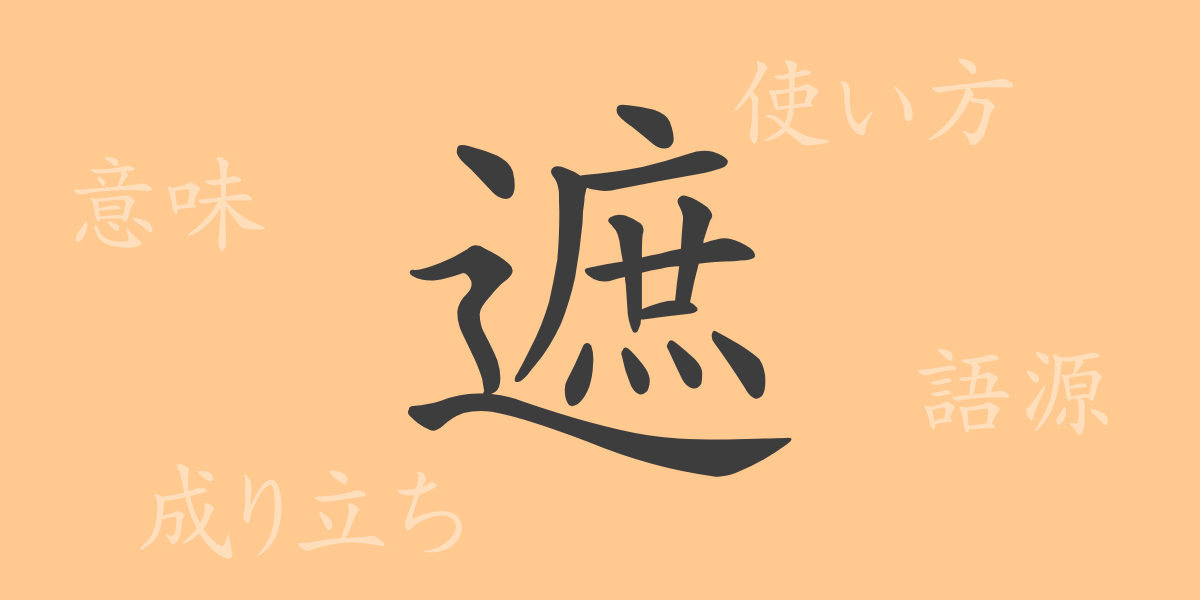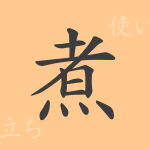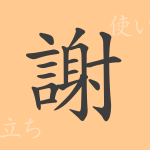Each character in the Japanese language holds its own unique beauty and meaning. Kanji, in particular, reflect the deep aspects of Japanese culture through their formation and evolution. This time, we focus on the commonly used kanji “遮(しゃ)” and delve into its etymology, meaning, usage, and characteristics as a kanji. Additionally, we will explore idioms and phrases containing “遮(しゃ)” to uncover the rich world of expressions that this single character offers.
Origins of 遮(しゃ) (Etymology)
The kanji “遮(しゃ)” traces its origins back to ancient China. This character was created to denote the action of stopping or obstructing someone or something on the path, that is, “to obstruct.” It is a phono-semantic compound character, where “辶(しんにょう)” signifies walking, and “者(しゃ)” provides the phonetic component. Originally, it depicted an image of obstructing someone from crossing a path, evolving into its current form over time.
Meanings and Uses of 遮(しゃ)
The kanji “遮(しゃ)” means “to obstruct,” “to stop,” or “to block.” It is frequently used in contexts where something is being blocked, separated, or hindered, not only in a physical sense but also in abstract concepts. For example, “光を遮るカーテン” (curtains that block light) and “意見を遮る” (to interrupt an opinion).
Readings, Stroke Count, and Radical of 遮(しゃ)
Understanding the readings and structure of the kanji “遮(しゃ)” can deepen our comprehension of it.
- Readings: The on’yomi (音読み) is “シャ(しゃ),” and the kun’yomi (訓読み) includes “さえぎる(さえぎる)” and “とざす(とざす).”
- Stroke count: The total stroke count for “遮(しゃ)” is 14.
- Radical: The radical for “遮(しゃ)” is “辶(しんにょう),” which relates to walking or movement.
Idioms, Phrases, and Proverbs Using 遮(しゃ)
Idioms and phrases containing “遮(しゃ)” reflect the rich meanings of this kanji. Here are some examples:
- 遮二無二(しゃにむに): To tackle something wholeheartedly and with single-minded dedication.
- 遮光(しゃこう): To block light, as with curtains or blinds.
- 遮断(しゃだん): To cut off or interrupt something, such as a roadblock preventing passage.
- 遮ることなく(さえぎることなく): To proceed without any obstacles, indicating smooth progress.
Conclusion on 遮(しゃ)
The kanji “遮(しゃ)” has carried diverse meanings and uses from its formation to the present day, playing a significant role in the Japanese language. Whether indicating physical obstructions or abstract concepts of interruption, “遮(しゃ)” is versatile in its application. Additionally, idioms and phrases containing “遮(しゃ)” showcase its rich expressive power, highlighting the depth of the Japanese language. The next time you encounter “遮(しゃ)” in daily life, recalling its historical and semantic background might add an extra lay

























